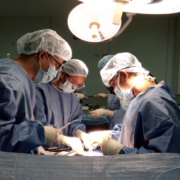Each year, approximately 12,000 Filipinos suffer end-stage renal disease, a period wherein the options are to undergo dialysis or kidney transplant for the organ to function well. People with end-stage renal disease need to have waste removed from their bloodstream through a machine (dialysis) or a kidney transplant to stay alive. Dialysis is typically done for two to three times a week—about four hours per session, thus, a number of patients encounter difficulties in managing the demands of the treatment. It becomes a struggle for these patients to achieve and sustain a satisfying quality of life.
Several studies have shown that kidney transplantation offers the best option for patients with kidney failure. The quality of life of a transplant patient is superior to one on dialysis (Lagula et al Philippine Journal of Internal Medicine Jan-Feb 2002). To answer the needs of patients requiring transplants, St. Luke’s Medical Center-Global City established the Eduardo M. Cojuangco, Jr. and Ramon S. Ang Center for Organ Transplantation, named after the two prominent businessmen who supported the Center’s organ donation program and committed themselves to help transplant patients find matching organ donors, whether living or deceased.
The program aims to change people’s perception about organ donation in order to create a new culture which can save more lives. The donation was initiated by Dr. Angel Joaquin Amante, head of St. Luke’s-Global City’s Center for Organ Transplantation, and Assistant Medical Director Dr. Brian Michael Cabral, who also heads the hospital’s Renal Diseases Service and is also the VP and Assistant Head for the Medical Practice Group. Dr. Cabral says that the fear and hesitation of people getting donations from their friends, family or even the deceased is due to cultural aspects. “The only reason it has not taken off is cultural: A great number of Filipinos just don’t want to give parts of their recently departed loved ones away.” Dr. Cabral stressed that receiving a kidney from a deceased donor has a huge potential to save many lives. He emphasized that it is an opportunity to better the lives of others. Amante added that the goal of organ donation is to let the family of the person who passed away know that their loved one can still live on through other people.
The survival rate of patients who undergo the kidney transplant are at par with local and international outcomes. Cabral reminds that kidney transplant is the best treatment because it has a high survival rate. “It’s the best option for treatment. As a matter of fact, kidney transplant should not be considered as a last resort—it should be the first resort for those people who meet the requirements for kidney transplantation,” Cabral said.






